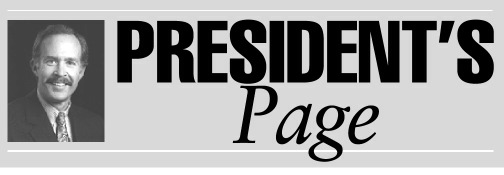The Rochester
Review, University of Rochester, Rochester, New York, USA
![]()


I have just arrived back from the semi-annual meeting of the 62 presidents of the Association of American Universities, described as the preeminent private and public national research universities (albeit two are Canadian). Although Rochester actually became a member of the AAU in 1949, one of the great legacies of W. Allen Wallis is the planning, trajectory, and hiring that solidified Rochester's place among that august crowd.
While we undergo substantial strategic initiatives to continue on that path so that we remain appropriately described as one of the nation's top universities, it is also increasingly apparent--and important to note--that we need to look at Rochester through international, and not just national, lenses.
There are a number of ways to measure this. Fully 19 percent of our student population comes from outside the United States, including 11 percent of our students in the College and 20 percent of our Eastman students. Most remarkably, perhaps, 45 percent of the Simon School's full-time M.B.A. program is comprised of students from outside the United States.
Equally important, and impressive, is the range of foreign programs that we run through, or with, other international entities. Just last September, I went to Krakow, Poland, to sign an extension of a cooperative agreement with Jagiellonian University (Copernicus and Pope John Paul II, among others, studied there). In a multi-faceted arrangement, Rochester has ties with Jagiellonian University both through the College's Center for Polish and Central European Studies and through the School of Medicine and Dentistry.
Similarly, through ORT-Braude College in Israel, we have designed a unique opportunity for our engineering students to spend a semester abroad without losing any time in terms of meeting the engineering degree requirements. And--continuing with our archeological program in Israel--we have established a long-term relationship with the Israel Antiquities Authority concerning digs in the Galilee, while enabling Rochester to "borrow" on short-term arrangements some of the best archeologists in the world to instruct our students in Rochester. (One product of this collaboration, the multi-year dig at Yodefat, is the subject of a PBS documentary, "Echoes of the Ancients," being broadcast nationwide on December 17.)
Numerous other College arrangements exist, such as our semester-long "on location" course in Arezzo in Italy, but the College is far from alone in international contacts. As impressive as its international component is to the domestic M.B.A. program, the Simon School also offers two very popular--and successful--executive M.B.A. programs in Europe, one with Nijenrode University in the Netherlands and another in cooperation with the University of Bern in Switzerland. And, in what has become a popular tradition, 51 of our Eastman students spent several weeks in the Far East last summer, as the Eastman Wind Ensemble gave over a dozen performances to sold-out houses throughout Japan.
The international reach of the University can be seen at the individual faculty level, as well. Lionel McKenzie has provided doctoral supervision for almost three dozen Japanese economists who now form the core of a very real "Rochester school" of economics in Japan (and for which--at least in part--Professor McKenzie has received the Order of the Rising Sun).
At the last board meeting, our trustees heard from four of the five new research center directors in connection with the exciting Medical Center strategic plan, which is designed to set a blueprint for biomedical research at Rochester in the 21st century. Of these new center directors, two come from outside the United States--Tim Mosmann from the University of Edmonton, Alberta, and Helmut Land from the Imperial Research Fund in London.
This listing is only partial, of course, but its import is clear. We need to get into the mindset of describing Rochester not just as a great national university, but as a great international university. The intellectual climate of the United States, as well as the vigorous presence of major private institutions such as the University of Rochester, has made higher education a significant comparative advantage of this country. The kinds of international ties touched on in this column are an outgrowth of that strength--both of American higher education and of the University of Rochester. It well prepares us--and our students--for the incredibly shrinking global world we will encounter in the 21st century.
Thomas H. Jackson

Our International University
| UR Home |
Review Contents
| Mail |

Maintained by University Public Relations